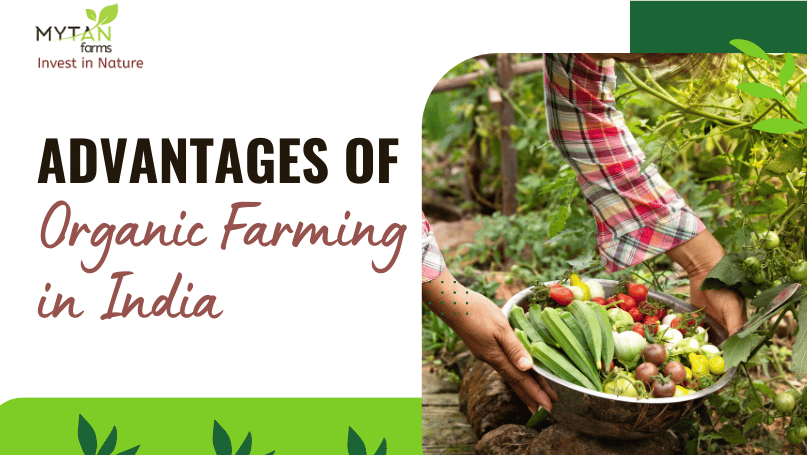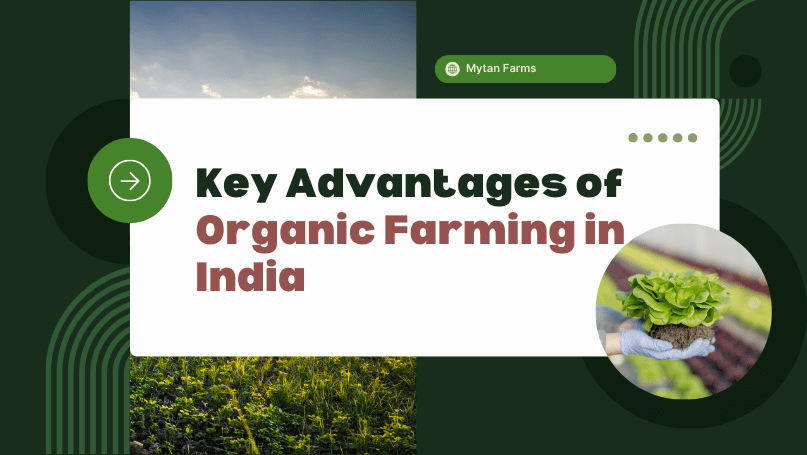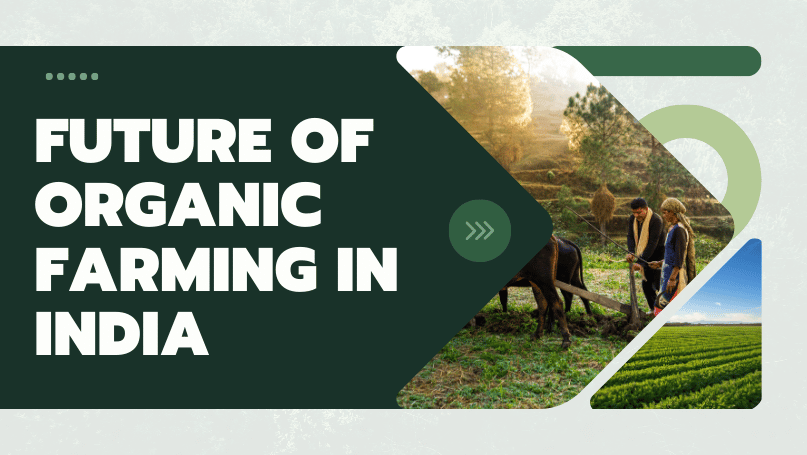
Advantages of Organic Farming in India
In organic farming, crops are grown using natural methods. It stays away from genetically modified seeds, pesticides, and chemical fertilizers.
Instead, organic farming uses natural products like cow dung and compost to make the soil healthy and crops safe. Organic farming has gained popularity in India in recent years. Organic fruits, vegetables, and grains are safer and healthier, and that’s why many people are now choosing them.
Organic farming benefits in India include helping farmers use organic farming to save money, enhance soil quality, and save the environment. Traditional farming, which is comparable to organic farming, has a long history in India. India is seeing a rapid increase in organic farming due to growing environmental and health consciousness.
The government also assists farmers by providing training and support for organic farming practices. Considering all organic farming benefits the environment, human health, and Indian agriculture’s future.
Key Advantages of Organic Farming in India

There are several advantages of organic agriculture for both the environment and people. It grows food naturally, preserving both the environment and human health.
Organic farming benefits in India include providing a safer and more sustainable method of growing crops in India where farming is an integral part of daily life.
Environmental Benefits
There are several ways that organic farming contributes to environmental protection. Because it doesn’t use dangerous chemicals, it pollutes less water and soil.
By using natural pest control techniques and fertilizers, safe and healthy soil is maintained. By permitting animals, insects, and birds to roam freely on the farm, it also promotes biodiversity.
Health Benefits
Food produced by organic farming does not include dangerous chemicals and pesticides. This food is more nutrient-dense, fresh, and natural.
Consuming organically produced food can reduce your chance of developing allergies, skin conditions, and cancer.
Older adults, pregnant women, and children are safer because no artificial chemicals are used in organic farming. It also increases immunity and promotes a healthy lifestyle.
Economic Benefits
Organic farming benefits in India include helping farmers who grow organic fruits and vegetables increase their income. Both in cities and overseas there is a strong demand for organic products. People are willing to pay more for them because they believe they are safer and healthier.
Organic farming eventually lowers input costs by eliminating the need for pricey chemical pesticides and fertilizers. In addition, it enhances soil health, which makes farming more profitable and sustainable by helping farmers to produce better crops for many years.
Government Support & Schemes
several initiatives, the Indian government is helping farmers in switching to organic farming. For farmers who wish to use natural methods, the Paramparagat Krishi Vikas Yojana (PKVY) provides help and training to farmers.
Through
The Mission Organic Value Chain Development (MOVCD) enhances the sales of organic products and creates markets for farmers in the Northeast and hilly regions. Farmers can more easily transition to organic farming and increase their incomes because of these programs.
Challenges & Solutions
There are certain difficulties with organic farming in India. Starting with organic farming can be expensive. In addition to the time and expense required to become certified as an organic farm. Farmers must purchase natural fertilizers. Many farmers lack a thorough understanding of the advantages of organic agriculture.
Due to this, they can’t switch to Organic farming. The government helps cover the expenses by providing subsidies. Workshops and training courses are being planned to instruct farmers in organic certification, marketing, and practices. Increased adoption of organic farming and its long-term benefits are possible when farmers are guided and helped properly by giving them the knowledge, subsidies, and any kind of help that they need.
Success Stories of Organic Farming in India
In 2016, Sikkim became the first state in India to become entirely organic. Today, organic farming is practiced on all of its farmland. This shift has benefited the state’s ability to grow nutritious crops, preserve the environment, and attract tourists.
It now serves as a model for other Indian states. Many farmers in India have found success with organic farming outside of Sikkim.
For example, growing organic fruits and vegetables has allowed farmers in states like Uttarakhand, Kerala, and Maharashtra to make a good living.
These farmers grow their crops naturally and sell them for more money in domestic and foreign markets. Their achievements show that organic farming can be helpful and healthful too.
Future of Organic Farming in India

India’s organic farming industry has a promising future. The public is now more conscious of environmental and health concerns. They want food that does not contain dangerous chemicals.
Organic farming benefits in India are becoming more evident as selling organic goods in regional and international markets can increase Indian farmers’ incomes. Through subsidies and training, the government is also promoting organic farming. Organic farming is being promoted in many Indian states, particularly in the Northeast.
Globally, there is an increasing demand for organic food. Many nations’ citizens demand wholesome food free of chemicals. For organic fruits, vegetables, grains, and spices, they are ready to pay a premium.
For Indian farmers, this is a huge opportunity. A wide range of organic crops can be grown in India because of its rich soil and pleasant weather. Many nations import organic food, including the United States, Germany, and the United Arab Emirates. These markets are open to the export of goods by Indian farmers and businesses.
The advantages of organic agriculture are also seen in how global standards can be met by Indian farmers with the right guidance and assistance. Organic farming is becoming simpler and more effective because of the new technology. The use of organic inputs such as compost, biofertilizers, and natural pesticides has improved and become simpler.
In the long run, it is a sustainable farming method that can help both farmers and consumers.
Conclusion
There are lots of advantages to organic agriculture. It increases farmers’ incomes, provides good food, and maintains a clean environment. These days, India and other nations have a strong demand for organic products. Mytan Farms supports this growing trend by offering well-managed organic farmlands that are both sustainable and profitable.
Farmers are finding it easier to switch to organic farming because of new technology and government assistance. Buying organic products is a way for consumers to support the industry.
Farmers should educate themselves on organic practices and gradually implement them. By working together with us at Mytan Farms, we can improve the safety and sustainability of farming in India. Organic farming benefits not only human health but also the future of our planet.
FAQs on Organic Farming in India
1. What is organic farming, and how is it different from traditional farming?
Organic farming grows crops without the use of chemicals by using natural methods. It employs natural pest control, biofertilizers, and compost. Conventional farming frequently makes use of chemical pesticides and fertilizers. In contrast to traditional farming, which over time may damage soil and water, organic farming is safer for human health and the environment.
2. Is organic farming profitable in India?
In India, it is possible to make money from organic farming. Organic goods are more expensive. Additionally, farmers save money by using fewer chemicals. Farmers can make more money as demand in India and other nations rises. However, as the farm and soil adapt to organic practices, initial profits might take some time.
3. How does organic farming benefit the environment?
The environment is safeguarded through organic farming. In addition to conserving water, it lowers pollution and maintains healthy soil. By avoiding dangerous chemicals the air and water remain pure. Insects that aid in farming bees and birds are also supported. All things considered, it preserves the land for future farming and aids in maintaining the equilibrium of nature.
4. What are the challenges faced by organic farmers in India?
Organic farmers deal with a lot of difficulties. Improving the health of soil requires time. It could be challenging to find organic inputs and seeds. Without the use of chemicals, controlling pests is more difficult. Organic food must also be properly certified, which is expensive. Additionally, some places have restricted market access, which makes product sales challenging.
5. Does the Indian government support organic farming?
Organic farming is supported by the Indian government, yes. It provides programs like Paramparagat Krishi Vikas Yojana (PKVY), financial assistance and training. Certain states provide additional assistance for organic goods. Additionally, the government encourages organic exports and assists with certification. More farmers are encouraged to switch to organic practices by this support.




